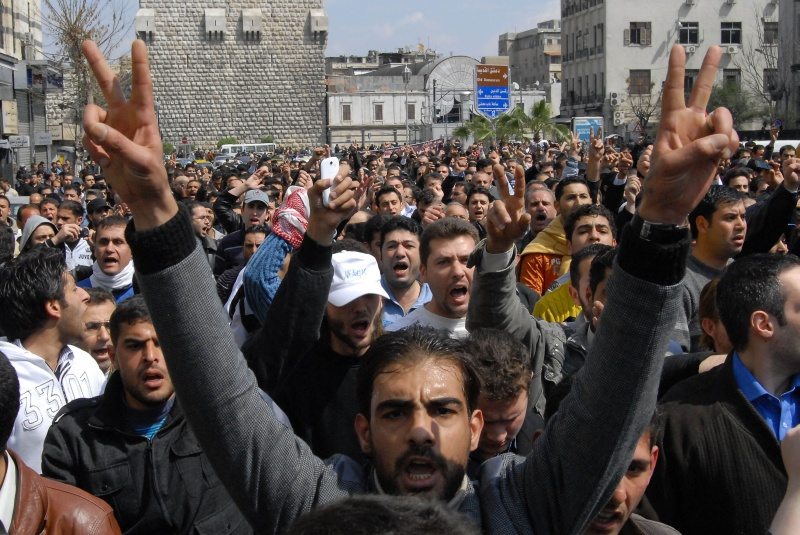UN chief Ban Ki-moon warned on Thursday that Syria risks a “catastrophic civil war” following the Houla massacre, as Washington slammed Moscow over its Syria policies.
Damascus regretted Ban’s warning and denied any responsibility in last week’s slaughter of 108 people, blaming “armed gangs” for the killings that have triggered international outrage.
And as Syrian rebels threatened to escalate their operations if President Bashar al-Assad’s regime does not meet a 0900 GMT Friday ultimatum to observe a UN-backed ceasefire, activists called for nationwide protests.
The rallies to be held on Friday will honour the 49 children killed in Houla, activists said on the Syrian Revolution 2011 Facebook page, describing them as “flares of victory.”
State television also called for prayers “in all of Syria’s mosques” on Friday for the Houla dead and for “all the country’s martyrs.”
Speaking in Istanbul, the UN chief said Damascus must implement the six-point peace blueprint brokered by UN-Arab League envoy Kofi Annan, which has been violated daily since April 12.
“I demand that the government of Syria act on its commitment to the Annan peace plan,” Ban said.
“The massacres of the sort seen last weekend could plunge Syria into a catastrophic civil war, a civil war from which the country would never recover.”
The UN says some of the 108 people slaughtered in the central Syrian town of Houla on Friday and Saturday were killed by artillery tank fire.
But the UN High Commissioner for Human Rights says most were summarily executed, and some UN officials have said there were suspicions of involvement by pro-government shabiha militiamen.
But Damascus on Thursday insisted a preliminary investigation showed “armed gangs” carried out the Houla killings.
“It appears that all the victims came from peaceful families who refused to rise up against the government or take up arms, but had rows with armed groups,” said General Kassem Jamal Sleiman, head of the probe.
“Killing children does not meet any goal of the government but those of the armed groups,” he said, insisting that regular troops were attacked by the gunmen but did not enter the area before or after the assault.
Syrian foreign ministry spokesman Jihad Makdisi dismissed Ban’s warning.
“It is regrettable that the Secretary General of the United Nations has departed from his mission of maintaining peace and security in the world to becoming a herald of civil war,” Makdisi told reporters.
But Washington’s UN envoy Susan Rice said Syria’s denials of involvement in Houla were a “blatant lie”, as she and Secretary of State Hillary Clinton slammed Russia’s policies in the crisis.
Rice condemned as “reprehensible” Russian arms deliveries to Syria, after reports last week that a Russian ship carrying weapons had arrived in the Syrian port of Tartus.
“With respect to the reported docking of a ship carrying Russian arms, this is obviously of the utmost concern given that the Syrian government continues to use deadly force against civilians,” she said.
Clinton, speaking in Denmark, also warned that civil war could erupt in Syria because of Russia’s policy of resisting UN Security Council action against Damascus.
The Russians “are telling me they don’t want to see a civil war. I have been telling them their policy is going help to contribute to a civil war,” Clinton said.
The rebel Free Syrian Army’s command inside the country, meanwhile, gave President Bashar al-Assad’s government an ultimatum, setting midday on Friday (0900 GMT) as the hour of reckoning.
If the regime “does not meet the deadline by Friday midday, the command … will no longer be tied by any commitment to the Annan plan … and our duty will be … to defend civilians,” a statement said.
“There is no more justification for us to unilaterally respect the truce because (Assad) has buried Annan’s plan,” it said, following the “barbarous” Houla massacre.
The FSA said it would announce in the coming days “a series of decisive and courageous decisions for the next phase” of its struggle.
The political opposition, the Syrian National Council, meanwhile urged Annan to raise the number of UN truce observers in Syria from their present number of 300 to 3,000.
But fresh cracks in the ranks of the opposition appeared on Thursday when Turkey-FSA chief Colonel Riyadh al-Assad denied there had been an ultimatum, prompting a sharp rebuke from a top rebel officer inside Syria.
“Anyone who wants to speak in the name of the FSA should do it from the battlefield, not through media,” said FSA Colonel Kassem Saadeddine.
“From now on, all decisions will be taken from inside Syria,” he told AFP in Beirut.
The Houla massacre has prompted Western governments, including the United States, Britain, France and Australia, to expel the senior Syrian diplomats in their countries.
As the international community mulled fresh moves against Syria, the US envoy to NATO, Ivo Daalder, said on Thursday that military action was not under consideration.
“The issue of military intervention, which is also always complex, is not right now on the table when it comes to Syria,” he said.
The US Treasury meanwhile announced that its sanctions chief would travel to Israel, Russia and Britain next week for talks aimed at implementing international sanctions against Syria and its key regional ally Iran.
During his June 3-8 trip, Under Secretary for Terrorism and Financial Intelligence David Cohen will brief counterparts on the powers Washington has to expand sanctions on Iran and Syria, a statement said.
On the ground, Syrian forces resumed shelling in Houla, which had begun on Wednesday, with a young boy killed by a sniper, the Syrian Observatory for Human Rights said on Thursday.
And battles raged as troops and rebels clashed across the country, with the Observatory saying a total of 44 people were killed on Thursday, 25 of them civilians in Homs province.










